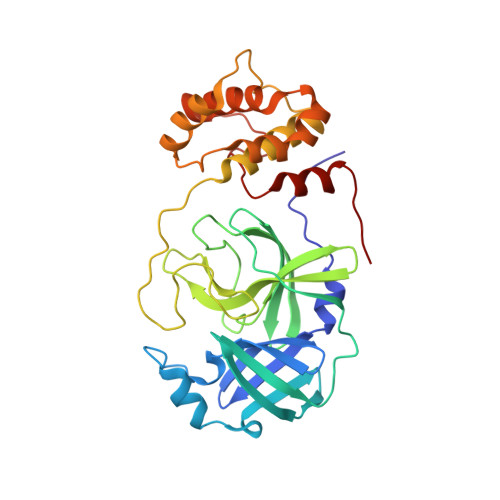An orally available P1'-5-fluorinated M pro inhibitor blocks SARS-CoV-2 replication without booster and exhibits high genetic barrier.
Higashi-Kuwata, N., Bulut, H., Hayashi, H., Tsuji, K., Ogata-Aoki, H., Kiso, M., Takamune, N., Kishimoto, N., Hattori, S.I., Ishii, T., Kobayakawa, T., Nakano, K., Shimizu, Y., Das, D., Saruwatari, J., Hasegawa, K., Murayama, K., Sukenaga, Y., Takamatsu, Y., Yoshimura, K., Aoki, M., Furusawa, Y., Okamura, T., Yamayoshi, S., Kawaoka, Y., Misumi, S., Tamamura, H., Mitsuya, H.(2025) PNAS Nexus 4: pgae578-pgae578
- PubMed: 39831159
- DOI: https://doi.org/10.1093/pnasnexus/pgae578
- Primary Citation of Related Structures:
8UH5, 8UH8, 8UH9 - PubMed Abstract:
We identified a 5-fluoro-benzothiazole-containing small molecule, TKB272, through fluorine-scanning of the benzothiazole moiety, which more potently inhibits the enzymatic activity of SARS-CoV-2's main protease (M pro ) and more effectively blocks the infectivity and replication of all SARS-CoV-2 strains examined including Omicron variants such as SARS-CoV-2 XBB1.5 and SARS-CoV-2 EG.5.1 than two M pro inhibitors: nirmatrelvir and ensitrelvir. Notably, the administration of ritonavir-boosted nirmatrelvir and ensitrelvir causes drug-drug interactions warranting cautions due to their CYP3A4 inhibition, thereby limiting their clinical utility. When orally administered, TKB272 blocked SARS-CoV-2 XBB1.5 replication without ritonavir in B6.Cg-Tg(K18-hACE2)2-Prlmn/J-transgenic mice, comparably as did ritonavir-boosted nirmatrelvir. When the ancestral SARS-CoV-2 was propagated with nirmatrelvir in vitro, a highly nirmatrelvir-resistant E166V-carrying variant (SARS-CoV-2 E166V-P14 ) readily emerged by passage 14; however, when propagated with TKB272, no variants emerged by passage 25. SARS-CoV-2 E166V showed some cross-resistance to TKB272 but was substantially sensitive to the compound. X-ray structural analyses and mass-spectrometric data showed that the E166V substitution disrupts the critical dimerization-initiating Ser1'-E166 interactions, thereby limiting nirmatrelvir's M pro inhibition but that TKB272 nevertheless forms a tight binding with M pro 's catalytic active sight even in the presence of the E166V substitution. TKB272 shows no apparent genotoxicity as tested in the micro-Ames test. Highly potent TKB272 may serve as a COVID-19 therapeutic, overcome resistance to existing M pro inhibitors.
Organizational Affiliation:
Department of Refractory Viral Diseases, National Center for Global Health and Medicine Research Institute, 1-21-1 Toyama, Shinjuku-ku, Tokyo 162-8655, Japan.
















